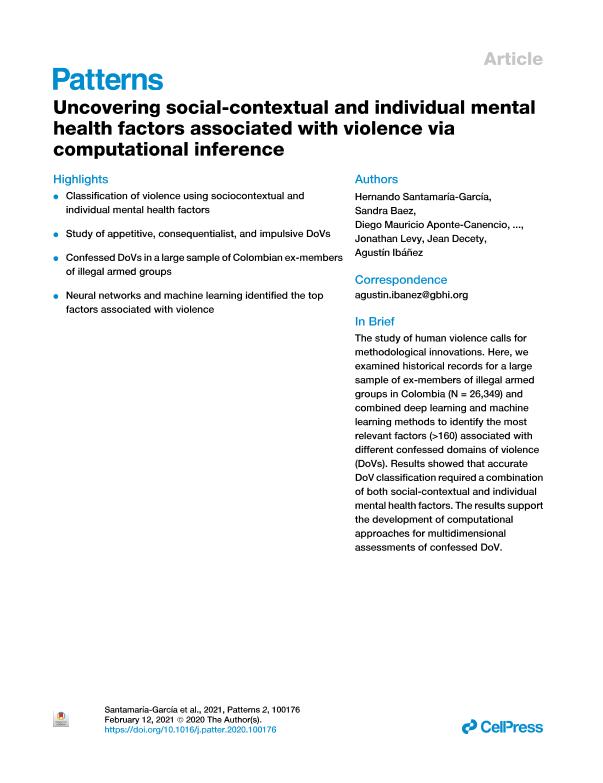Artículo
Uncovering social-contextual and individual mental health factors associated with violence via computational inference
Santamaría García, Hernando; Báez Buitrago, Sandra Jimena ; Aponte Canencio, Diego Mauricio; Pasciarello, Guido Orlando; Donnelly Kehoe, Patricio Andres
; Aponte Canencio, Diego Mauricio; Pasciarello, Guido Orlando; Donnelly Kehoe, Patricio Andres ; Maggiotti, Gabriel; Matallana, Diana; Hesse Rizzi, Eugenia Fátima
; Maggiotti, Gabriel; Matallana, Diana; Hesse Rizzi, Eugenia Fátima ; Neely, Alejandra; Zapata, José Gabriel; Chiong, Winston; Levy, Jonathan; Decety, Jean; Ibáñez, Santiago Agustín
; Neely, Alejandra; Zapata, José Gabriel; Chiong, Winston; Levy, Jonathan; Decety, Jean; Ibáñez, Santiago Agustín
 ; Aponte Canencio, Diego Mauricio; Pasciarello, Guido Orlando; Donnelly Kehoe, Patricio Andres
; Aponte Canencio, Diego Mauricio; Pasciarello, Guido Orlando; Donnelly Kehoe, Patricio Andres ; Maggiotti, Gabriel; Matallana, Diana; Hesse Rizzi, Eugenia Fátima
; Maggiotti, Gabriel; Matallana, Diana; Hesse Rizzi, Eugenia Fátima ; Neely, Alejandra; Zapata, José Gabriel; Chiong, Winston; Levy, Jonathan; Decety, Jean; Ibáñez, Santiago Agustín
; Neely, Alejandra; Zapata, José Gabriel; Chiong, Winston; Levy, Jonathan; Decety, Jean; Ibáñez, Santiago Agustín
Fecha de publicación:
12/02/2021
Editorial:
Cell Press
Revista:
Patterns
ISSN:
2666-3899
Idioma:
Inglés
Tipo de recurso:
Artículo publicado
Clasificación temática:
Resumen
The identification of human violence determinants has sparked multiple questions from different academic fields. Innovative methodological assessments of the weight and interaction of multiple determinants are still required. Here, we examine multiple features potentially associated with confessed acts of violence in ex-members of illegal armed groups in Colombia (N = 26,349) through deep learning and feature-derived machine learning. We assessed 162 social-contextual and individual mental health potential predictors of historical data regarding consequentialist, appetitive, retaliative, and reactive domains of violence. Deep learning yields high accuracy using the full set of determinants. Progressive feature elimination revealed that contextual factors were more important than individual factors. Combined social network adversities, membership identification, and normalization of violence were among the more accurate social-contextual factors. To a lesser extent the best individual factors were personality traits (borderline, paranoid, and antisocial) and psychiatric symptoms. The results provide a population-based computational classification regarding historical assessments of violence in vulnerable populations. We assessed a comprehensive group of social-contextual and individual mental health factors to classify confessed acts of violence committed in the past among a large sample of Colombian ex-members of illegal armed groups (N = 26,349). We used a novel data-driven approach to classify subjects based on four confessed domains of violence (DoVs) and including two groups, (1) ex-members who admitted violent acts and (2) ex-members who denied violence in each DoV, matched by sex, age, and education stage. We found that accurate classification required both social-contextual and individual mental health factors, although the social-contextual factors were the most relevant. Our study provides population-based evidence on the factors associated with historical assessments of violence and describes a powerful analytical approach. This study opens up a new agenda for developing computational approaches for situated, multidimensional, and evidence-based assessments of violence. The study of human violence calls for methodological innovations. Here, we examined historical records for a large sample of ex-members of illegal armed groups in Colombia (N = 26,349) and combined deep learning and machine learning methods to identify the most relevant factors (>160) associated with different confessed domains of violence (DoVs). Results showed that accurate DoV classification required a combination of both social-contextual and individual mental health factors. The results support the development of computational approaches for multidimensional assessments of confessed DoV.
Archivos asociados
Licencia
Identificadores
Colecciones
Articulos(SEDE CENTRAL)
Articulos de SEDE CENTRAL
Articulos de SEDE CENTRAL
Citación
Santamaría García, Hernando; Báez Buitrago, Sandra Jimena; Aponte Canencio, Diego Mauricio; Pasciarello, Guido Orlando; Donnelly Kehoe, Patricio Andres; et al.; Uncovering social-contextual and individual mental health factors associated with violence via computational inference; Cell Press; Patterns; 2; 2; 12-2-2021; 1-21
Compartir
Altmétricas



